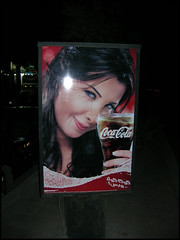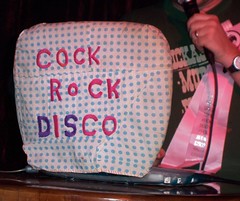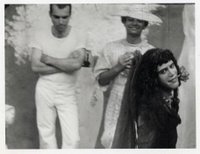
Marisa Meltzer & Julianne Shepherd have an article in the latest issue (March) of
Spin dealing with French rap and the 2005 riots. (Sorry, it's not available on-line.)
They make the point (which hawblawg made earlier
here and
here) that "French rappers had been vocal about the banlieues for years." The first to "potently address the problems in the banlieues," was the group Suprême NTM. (See Paul Silverstein and Chantal Tetreault's article in
Middle East Report Online, "
Urban Violence in France," which opens with some potent NTM lyrics.)
Besides making that rather (to me) obvious observation, the article does an overview of the history and present of French rap that I found useful because I've gotten quite out of touch with the scene. Here are some of the main points:
1. France is the second-largest of consumer of hip-hop in the world, after the US. Hip-hop style is arguably as ubiquitous in France as it is in the US. As in the US, the culture of the youth of the social and economic margins has conquered the cultural "center."
2. Lyrics are given the most weight in French rap. (That is, they are privileged over beats or flow or sound of the mix.) According to Meltzer & Shepherd, this puts them in the tradition of Edith Piaf, Serge Gainsbourg and Charles Aznavour. French intellectual supporters in particular are prone to making such claims, as for instance critic Thomas Ravier, writing in the literary magazine
La Nouvelle Revue Française, who compared rapper
Booba (pictured above) with Céline and Proust. (Such pronouncements have been common ever since rap appeared on the French scene in the late '80s; see the article I co-authored with Joan Gross & David McMurray, "Arab Noise and Ramadan Nights:
Rai, Rap and Franco-Maghrebi Identities" in Lavie & Swedenburg,
Displacement, Diaspora and Geographies of Identity, for some examples [p. 144, p. 154 f.n. 44].)
3. In the French census, immigrants and anyone under 18 born to immigrant parents is counted as a "foreigner." Hence the anti-foreigner rhetoric that was so prevalent from the French media during the October riots. (If I'm not mistaken, the children of immigrants can choose to take French citizenship at age 18.)
4. French rappers to listen for (besides the old school of NTM, IAM, Arsenik, Fonky Family, Saïan Super Crew, and Ministère A.M.E.R.) are:
"
Maintstream heavy hitters" Rohff, Sinik
"
Street favorites" Booba, Disiz la Peste, Tandem
"
Unmitigated pop acts" K-Maro (a Lebanese Canadian often compared to MC Hammer & Will Smith)
Others mentioned include TTC, Tandem, and La Rumeur.
5. Given the relative absence of ethnic minorities in the government or the media, and the lack of any strong locally-based leadership, the only real "public" representatives of the youth of the banlieues are the rappers.
In sum: the problems of racialized minority youth in the banlieues are awful. Rappers who vocalize these problems are
huge in the domain of French pop culture. No effective political force exists to mobilize around the issues of the banlieues, and so, rappers are the only effective voices.
One important issue that the article fails to address adequately is the strong Arab and Muslim (Arab and African) character of the banlieues. Chill, also known as Akhenaton, one of the two lead vocalists in IAM, is quoted several times, but never identified as a Muslim (the son of Italian immigrants, he is a convert.)
The article appears in the wake of a recent
book review in
The Nation by the inciteful critic Greg Tate. In his review of three new volumes on hip-hop, plus one on the Black Arts Movement, Tate assesses the demise of hip-hop's political promise, its rapid move from "folk culture to commercial subculture to global youth culture to global capitalist marketing tool." What once was "considered mad-scary, dangerous and actionable by Congress and national law-enforcement agencies, has turned to dust--or, more accurately, the fool's gold of nouveau bling fortunes."
Tate goes on, "What's often forgotten is that hip-hop used the evil empire of the industry to further its own ends--subverting the mechanisms and formulas of pop to forge platinum hits with litte or no airplay, music video or promotion...But hip-hop also paid a price for the ticket of inclusion. By making a devil's bargain with hyper-capitalism, hip-hop lost not only its freedom of speech but its powers of speech..."
And, "Most of the hip-hop audience barely (if ever) experienced it as a radicalizing political force, and for new listeners it's merely another Internet menu item."
What I think Tate partially misses is that our political hopes (in the days when "conscious" rap acts like Public Enemy and KRS One were pre-eminent) for hip-hop were not realized because, like in France, rap artists vocalized sentiments in the absence of effective voices from grass-roots political leaders. Hip-hop, I believe, can be a powerful ally or energizer of progressive political movements, but when artists are the only voice, or the loudest voice...turning to dust, or fool's gold, is a likely outcome.
Tags:
hip-hop,
France




















